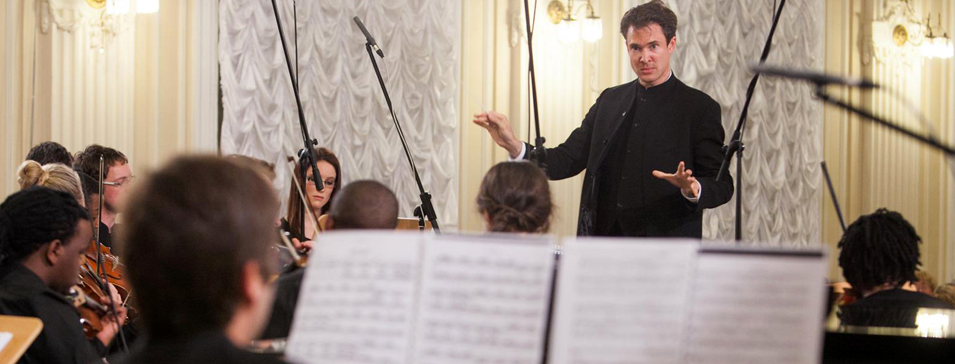 |
| Jan Moritz Onken conducting the Camerata during their performance at the 13th International Conservatoire in St Petersburg, Russia. |
The OSM CAMERATA (OSMC), flagship ensemble of the University of the Free State’s Odeion School of Music, received a standing ovation during a gala concert at the 13th International Conservatoire Festival presented on 7 November 2013 in the Glazunov Hall under the baton of Maestro Jan Moritz Onken.
The International Conservatory Festival was founded in 2001 by the St Petersburg Rimsky Korsakov Conservatory and has since then become an annual highlight on the concert calendar of St Petersburg.
For the last thirteen years, the festival has developed as a centre of excellence for artists, lecturers, and music experts who represent higher institutions of music from almost every continent. This forum has introduced more than 200 conservatories internationally, and literally produced hundreds of concerts, master’s classes and lectures. Internationally-acclaimed musicians such as Yuri Temirkanov, Rodion Shchedrin, Saulius Sondeckis, Krzysztof Penderecki, Valery Gergiev, Vasily Sinaisky and Semyon Bychkov, as well as young talented performers on the brink of their international careers, have participated in the festival over the years.
The OSMC presented the artistic director of the festival, Prof Lydia Volcheck, with audio-visual material as an audition and received a formal invitation from Prof Mikhail Gantvarg, Rector of the St Petersburg Rimsky Korsakov Conservatoire, in May 2013. Jan Moritz Onken (who was appointed as the OSMC chief conductor and artistic director for 2012) prepared the ensemble with vigour and discipline. Experienced international OSM alumni and several young international professionals served as mentors throughout the year preceding the event.
The OSMC gave two recitals during the festival – a gala performance in the Glazunov Hall, as well as a concert in the St Petersburg White Hall. For the first concert on 7 November (entitled FOUR CONTINENTS FESTIVAL), the OSMC shared the stage with a piano duo from the Karol Szymanowski Academy of Music (Katowice, Poland), the String Quartet of the Colburn Conservatory of Music (Los Angeles, USA), as well as an ensemble of Japanese Traditional Instruments from the Tokyo University of the Arts (Japan).
After the last reverberating notes of the performance of the Phantom Waltz (a work commissioned by the OSM from the South African composer Hendrik Hofmeyr), a thunderous applause and shouts of bravo exploded! The OSMC responded spontaneously with a kwela improvisation as an encore.
Dagbreek broadcast: http://bit.ly/1evTgR3